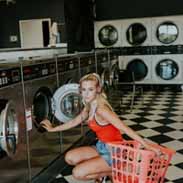Social Learning Theories – Flashcards
Unlock all answers in this set
Unlock answersquestion
dollard and miller's social learning theory
answer
This social learning theory is based on motivations/drives and their actual rewards/punishments.
question
habit hierarchy
answer
[dollard & miller] the idea that the behavior you are most likely to perform resides at the top, and least is at the bottom
question
drive
answer
[dollard & miller] a state of tension that feels good when reduced. it is reduced by satisfying a need.
question
motivations
answer
[dollard & miller] what do you want? why do you want it? these questions fuel...
question
primary drive
answer
[dollard & miller] a type of drive that includes food/water/physical comfort/sexual gratification
question
secondary drive
answer
[dollard & miller] a type of drive that includes love, prestige, money, power, & the avoidance of fear/humiliation
question
drive reduction theory
answer
[dollard & miller] the idea that for a reward to encourage behavior it must satisfy a need
question
frustration-aggression hypothesis
answer
[dollard & miller] the natural reaction of frustration/urge to lash out when one is blocked from a goal
question
approach-avoidance conflict
answer
[dollard & miller] the conflict between desire/fear and how it can change over time (i.e., increased drive can increase the tendency to approach/avoid a goal)
question
rotter's social learning theory
answer
This social learning theory focuses on the beliefs/expectancies about awards
question
expectancy value theory
answer
[rotter] this theory assumes that behavioral decisions aren't just determined by the presence/size of rewards but also by beliefs about the results of behavior
question
expectancy
answer
[rotter] one's belief about how likely the behavior will attain its goal (i.e., asking someone out)
question
specific expectancies
answer
[rotter] the belief that certain behavior at a certain time/place will lead to a certain outcome
question
generalized expectancies
answer
[rotter] general beliefs about whether anything you do will make a difference
question
locus of control
answer
[rotter] generalized expectancies are AKA...
question
internal locus of control
answer
[rotter] when one has high generalized expectancies and think that what they do affects what happens to them. **believe they have control over outcome/self-determinism
question
external locus of control
answer
[rotter] when one has low generalized expectancies and think that what they do won't affect what happens to them **no control over outcome, blame other forces
question
bandura's social learning theory
answer
This social learning theory focuses on efficacy expectations
question
self-efficacy
answer
[bandura] the belief about the self and what one is capable of doing. (it can be affected by self-concept, i.e., more likely to date someone who interests you if you think you're attractive)
question
observational learning
answer
[bandura] the idea that one learns a behavior by seeing someone else do it (role model)
question
reciprocal determinism
answer
[bandura] the analysis of how one shapes their own environments (i.e., what they choose: school/gang, social situations)
question
"self system"
answer
[bandura] this social learning theory develops a "___ ___" that has its own effects on behavior, independent of the environment. (___/___ problem.. which came first, environment acting on self or self influencing environment)
question
cognitive-affective personality system
answer
this idea believes personality is a "stable system" that mediates how one selects, interprets, processes social info, and generates behavioral responses. different systems interact within this system.
question
cognitive and behavioral construction competencies
answer
[cognitive-affective] these comprise one's mental abilities and behavioral skills (i.e., IQ, creativity, occupational abilities)
question
encoding strategies and personal constructs
answer
[cognitive-affective] these include one's ideas about how the world can be categorized, efficacy expectations, and beliefs about oneself.
question
subjective stimulus values
answer
[cognitive-affective] one's beliefs about the probabilities of attaining a goal if it's pursued and how much people value different rewarding outcomes.
question
self-regulatory systems and plans
answer
[cognitive-affective] a set of procedures that control behavior, including self-reinforcement, selection of situations, purposeful alteration of the situations selected, and how people directly control their own thoughts.
question
if...then contingencies
answer
[cognitive-affective] the goal is to use these to replace personality traits. they are the idea that many systems combine to yield particular actions which are triggered by situations.



